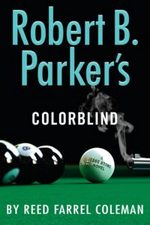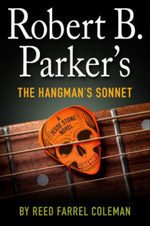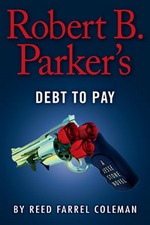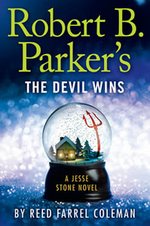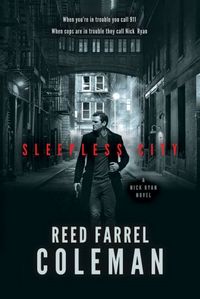 Sleepless City
Sleepless City
DETAILS: Series: Nick Ryan, #1 Publisher: Blackstone Publishing Publication Date: July 11, 2023 Format: eARC Length: 321 pgs. Read Date: June 23-26, 2023

I really want to tell you everything about this book—and I also want to tell you nothing at all beyond what the jacket copy is going to say and just tell you that if that sounds good to you—it is, and maybe better than you think. If that doesn’t sound good to you, it still is, but it’s probably not your cup of tea. Let’s see if I can accomplish something in-between.
What’s Sleepless City About?
Nick Ryan is a detective with the NYPD—that’s all he’s wanted to be, and he’s good at it. Sadly, because his father did the right thing and testified against a number of dirty cops several years ago—Ryan (and his father) are hated by most of the rank and file (and probably more of those above those). It doesn’t matter what Ryan does, his career is going nowhere. He’s still doing good work and seems to accept his lot in life.
Until a few things happen—I’m going to ignore those and move on to the results: Ryan is recruited by a lawyer representing unnamed interests who are going to change things for him. He’s going to get a promotion, he’s going to get to choose what cases he works on—whatever strikes his fancy and curiosity. But when this lawyer calls, he will push pause on everything in his life to take care of whatever these interests want. He’s basically going to be a fixer for the NYPD, cleaning up messes they can’t, preventing problems, and essentially doing whatever needs done. They’ll provide the resources (off the record and unseen), and he provides the results.
In Sleepless City we get the origin story for Det. Ryan, we see his first two cases, and get an idea what the resulting series should look like. Here’s the best thing about these two cases (which I’m going to share even if some might consider it mildly spoilery to do so because it’s a great selling point): unlike in 95% of thrillers/procedurals these two crimes that apparently have nothing to do with each other do not come around in the end to be related. They are actually distinct from each other. The resolution of one has practically nothing to do with the other (only that some goodwill generated by Ryan in one situation keeps him out of hot water in another).
Problem 1
A few recent incidents (nationally and in the city) have tensions high between the police and black communities at the tipping point. Ryan’s called into the scene of a shooting death of an interracial couple by someone who never should’ve joined the police. Ryan’s impulse—and that of several others, it should be noted—is to let the facts come out honestly.
But with the city near the boiling point, the fear is that the ensuing riots will leave too many dead, too many homes and businesses (and survivors) ruined, and the outcome of the protests and riots uncertain. Ryan has to cover this up without turning the victims into anything but victims.
So right away, you know that this book/series is going to live in morally gray (at best) areas. The lengths Ryan goes to—and the means by which he tries to accomplish this coverup are, tell you just as much about the way this series is going to work while the ends tell you about the ethical quagmire it tries to navigate.
Problem 2
The second issue centers around a Madoff-like character who stole a billion or so dollars—a large amount came from various law enforcement unions. The havoc wreaked on the first responders by this loss is great—and the consequences for Ryan’s brother (as an example) are devastating.
They’re going to be able to put Aaron Lister away for a long time—there’s no doubt about that. But no one can find the money—and nothing that the police, the FBI, or the courts have been able to do can get Lister to reveal where it is so they can try to repay the retirement funds.
Enter Nick Ryan.
No White Hats In Sight
We get the idea early on that Nick Ryan is a stand-up guy, ready to do the right thing regardless of the consequences. But after the events that I alluded to before his recruitment, he takes a different position on the legality of his actions (and maybe that was present before, but it’s certainly strengthened now)—it’s about the end result for Ryan now.
He’ll cut corners, he’ll make deals with whatever devils he needs to, and he’ll resort to methods that are so far beyond the pale of right, moral, or legal that they should be measured in light years.
In the real world—I’d hate someone like him and want to see anyone doing these vigilante acts imprisoned. And it’s not just Ryan, all law enforcement characters like him—Raylan Givens should be tried on several charges, Jack Reacher should’ve been locked up (not for the reasons he was initially arrested when we meet him—but for everything else in that book, and the dozens following). I want Malcolm Fox to expose Rebus for the offenses he’s committed (not necessarily the one’s Fox thinks he has, though). Kate Burkholder should confess to shooting that man (in self-defense) and the coverup of that shooting in her teens. And so on.
But in fiction? Bring. It. On. I love this stuff. Particularly because I don’t think Ryan’s modus operandi is sitting well with him—I’m betting as the series progresses, we’re going to see him having a harder and harder time with what he’s doing. Possibly even driving him to eventually trying to bite the hand that feeds him and exposing the interests directing him to the world (and going down with them).
I don’t have time to talk about the mess that is his personal life—but there’s plenty of fodder there for personal subplots for years to come.
So, what did I think about Sleepless City?
I had a great time with this book—it’s a great action ride and you can spend hours debating the ethical questions it raises (with yourself, with the book, or with others—and I can’t wait until people I know have had the chance to read this so we can have those discussions).
The speed at which Ryan is able to pull off these fixes probably strains credulity, but this isn’t the kind of book to care about how long things take. And by the time you start to wonder about plausibility, you’ve blown past the point where the question arose and you’re more focused on what happens next.
Because he’s the reigning gold standard, I will say there are a couple of scenes where Ryan gets to have a Jack Reacher-esque moment, scenes that have nothing to do with the plot, just a chance for Reacher/Ryan to demonstrate their abilities and stop a wrong outside of the primary storylines. The way that one of these resolves is so un-Reacher that I laughed and re-read it to see where Coleman made you think Ryan was going to try to match the ex-MP’s style. Ryan can be violent when he needs to be (quite), but he starts with his brains and mouth when he can in a situation—as satisfying as a good fight scene can be, someone thinking and talking his way through a problem can be as fun.
I think Coleman pulled off quite the feat here—this doesn’t feel like his previous work (although I freely admit I haven’t read as much of his earlier work as I want to, so maybe it does). This is more about action and less about reflection and thought. But it’s not mindless violence and the Ryan is a thoughtful character.
There are moments of fun—Coleman’s able to slip in a joke or two, too. But really this book is all about forward momentum, as if once Ryan has taken on this role he can’t stop moving and the book follows suit.
I assumed going in between the premise and my past experience with Coleman that I was going to enjoy the book—but Coleman and Ryan delivered something not quite what I was expecting—and Sleepless City is better for it.
I hope I’m reading these books for years to come—and suggest you pick up Sleepless City as soon as you can.
Disclaimer: I received this eARC from Blackstone Publishing via NetGalley in exchange for this post—thanks to both for this.

This post contains an affiliate link. If you purchase from it, I will get a small commission at no additional cost to you. As always, the opinions expressed are my own.
![]()








